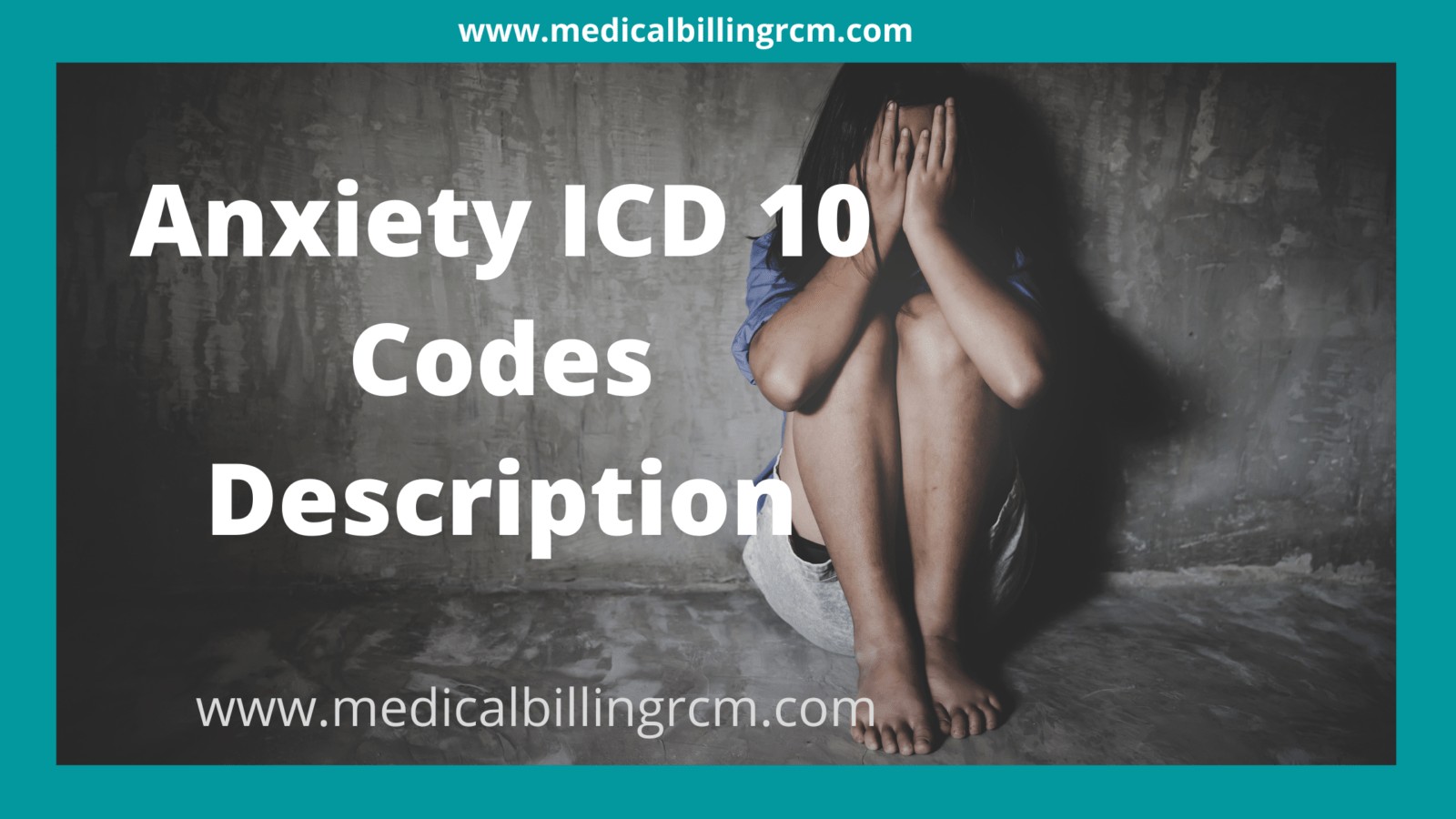ICD 10 or International Statistical Classification of Diseases (ICD) and health-related problems is a medical classification by the World Health Organization that is used by doctors to identify and code health conditions.
It is now in its 10th version. When it comes to Anxiety ICD 10 it has been coded to F41. 9 ICD 10 allows diagnosing GAD as follows
- F40.290 – Androphobia: A specific phobia characterized by an irrational and intense fear of men.
- F40.291 – Gynephobia: A specific phobia characterized by an irrational and intense fear of women.
- F40.298 – Other specified phobia: This code is used for specific phobias that do not fall under androphobia or gynephobia.
- F40.8 – Other phobic anxiety disorders: This code encompasses phobic anxiety disorders other than specific phobias (e.g., social phobia).
- F40.9 – Phobic anxiety disorder, unspecified: This code is used when a phobic anxiety disorder is diagnosed, but the specific subtype is not specified.
- F41 – Other anxiety disorders: This code category includes various anxiety disorders beyond phobic anxiety disorders.
- F41.0 – Panic disorder [episodic paroxysmal anxiety]: Characterized by recurrent and unexpected panic attacks, often accompanied by a fear of having more attacks or a significant behaviour change.
- F41.1 – Generalized anxiety disorder: Marked by excessive and persistent worry or anxiety about various events or activities.
- F41.3 – Other mixed anxiety disorders: This code is used for anxiety disorders that don’t fit precisely into other categories but involve symptoms from multiple anxiety disorder types.
- F41.8 – Other specified anxiety disorders: Used for specific anxiety disorders that don’t fall into the mentioned categories.
- F41.9 – Anxiety disorder, unspecified: This code is used when an anxiety disorder is diagnosed, but the specific type is not specified.
- F42 – Obsessive-compulsive disorder: Characterized by intrusive and distressing obsessions, often leading to repetitive, compulsive behaviours performed to alleviate anxiety.
- F42.2 – Mixed obsessional thoughts and acts: Refers to a specific type of obsessive-compulsive disorder characterized by both intrusive thoughts and compulsive behaviours.
- F42.3 – Hoarding disorder: Involves persistent difficulty in discarding possessions, leading to excessive accumulation of items and clutter.
- F42.4 – Excoriation (skin-picking) disorder: Characterized by recurrent and compulsive skin picking that can lead to skin damage.
- F42.8 – Other obsessive-compulsive disorder: This code is used for obsessive-compulsive disorders that don’t fit into the previously mentioned categories.
- F42.9 – Obsessive-compulsive disorder, unspecified: This code is used when an obsessive-compulsive disorder is diagnosed, but the specific subtype is not specified.
- F43 – Reaction to severe stress and adjustment disorders: This category covers various stress-related and adjustment disorders.
- F43.0 – Acute stress reaction: A short-term reaction to a highly stressful event or situation.
- F43.1 – Post-traumatic stress disorder (PTSD): A disorder in which develop exposure to a traumatic event and is characterized by symptoms like intrusive memories, avoidance, and hyperarousal.
- F43.10 – Post-traumatic stress disorder, unspecified: This code is used when a diagnosis of PTSD is made, but the specific subtype is not specified.
For check other ICD10 Codes please visist
- Dealing with tension for six months
A person dealing with tension and worrying for six months about everyday related problems.
- Suffer these four symptoms
If someone suffers from any four symptoms among these-
- Autonomic arousal symptoms
- Chest and abdomen concerning
- Brain and mind concerning
- General symptoms might include hot flashes
- Cold chills
- Numbness
- Symptoms of tension and other non-specific symptoms.
- Does not meet the criteria of the following
It should not be related to the problems under panic disorder, phobic anxiety disorder, obsessive-compulsive disorder and hypochondriacal disorder.
What is Anxiety?
Anxiety can be described as a natural response of the human body towards stress where a feeling of fear about what will happen takes place. If one suffers from anxiety for more than six months then it is likely possible to say that the person is dealing with anxiety disorder.
The feeling of being anxious or feeling fear maybe with the patient every time. It makes a person’s life dull and causes one to stop doing things that made them happy.
There is no age or gender for this mental illness as it can happen anytime and with anyone. If it is left untreated then chances are it can get worse with time!
Some of the common types of anxiety disorders include panic disorder, obsessive-compulsive disorder, phobia, social anxiety disorder, separation anxiety disorder, illness anxiety disorder, and post-traumatic stress disorder.
What are the Common Symptoms of Anxiety?
The feeling of anxiety may vary from one person to another. Generally, it is a feeling when the body feels disconnected from the mind.
Some people may experience it in the form of nightmares or painful thoughts that cannot be controlled, whereas others may receive worries or fear engulfing them about a particular place or event.
The most common symptoms of anxiety include,
- Increased heart rate
- Breathing rapidly
- Feeling of Restlessness
- Problems in focusing and concentrating
- Insomnia
As mentioned earlier, the symptoms of anxiety may vary from one to another which is why it is essential not to ignore how you feel about your health. Consult a mental health practitioner when situations arise- as you know prevention is better than cure!
How Can Anxiety be Treated Naturally?
The way one lives his life can be one of the major reasons behind dealing with anxiety problems. This is why it is crucial to focus on yourself, your work-life balance- and not get under unnecessary pressure.
Medications will definitely help but anxiety can also be cured with the help of natural remedies. The following natural remedies to treat anxiety naturally might help you, if you are not planning to get into an immediate medication.
Tips to get rid of anxiety naturally:
- Sleep
Try to get enough sleep and improve your sleep schedule.
- Staying active
Exercising, performing yoga, and meditation.
- Eating habits
Following a healthy diet makes you stay fit, not only physically, but mentally as well.
- No toxicants
Avoiding alcohol and cigarettes as much as possible.
- No caffeine
Try to avoid caffeine as well.
- Adopting good habits
Listening to soothing music and doing what you love. Sometimes joblessness creates these types of issues. So get involved in something you really wish to do.
These were some of the ways in which one can help to eliminate anxiety problems. It is important to keep patience as it won’t be treated overnight.
ICD-10 Code F41.9 is the Dx code used for Anxiety. It is a psychiatric disorder that is defined by anxious feelings or fears often accompanied by physical symptoms associated with anxiety. Anxiety ICD 10 codes complete information can also read at AAPC.COM.
Related Articles:
List of New ICD-10-CM Codes Added in 2021
Dyslipidemia ICD 10 Code E78.5

